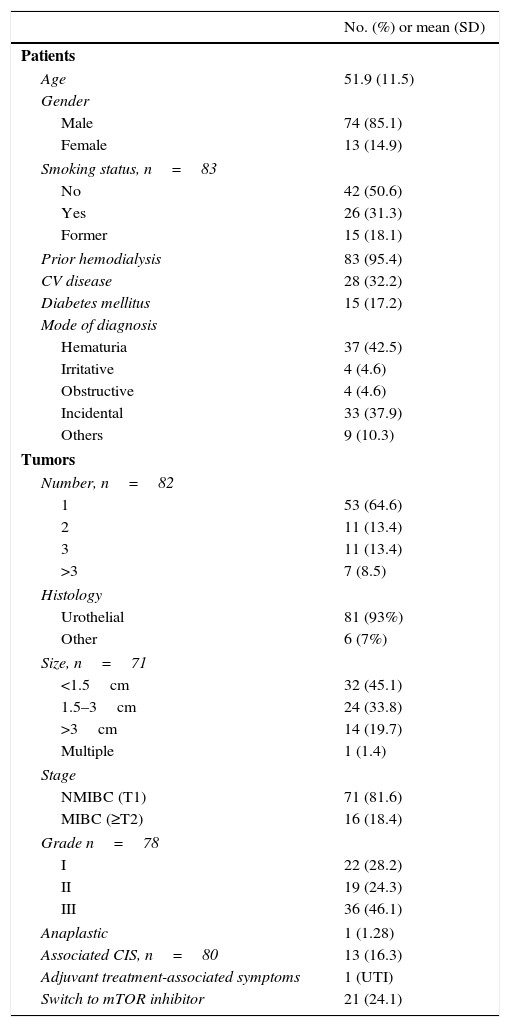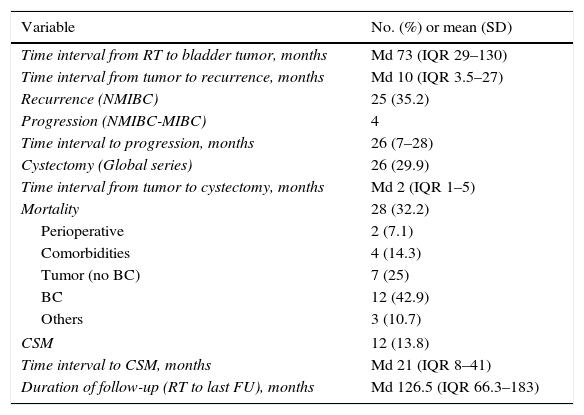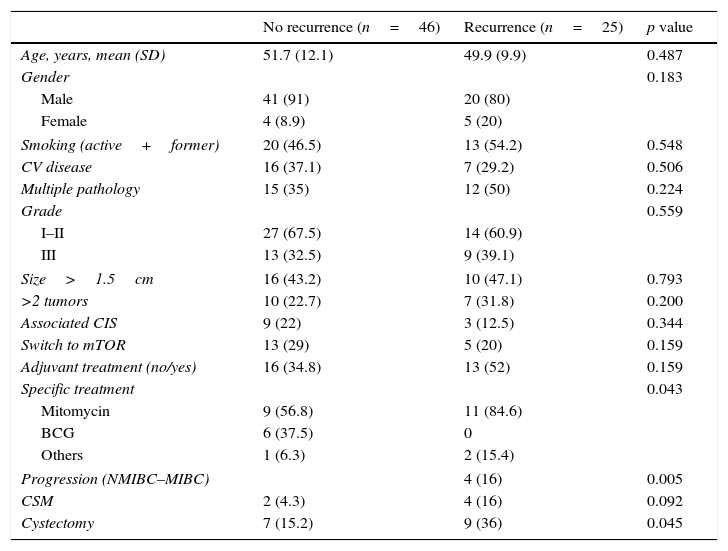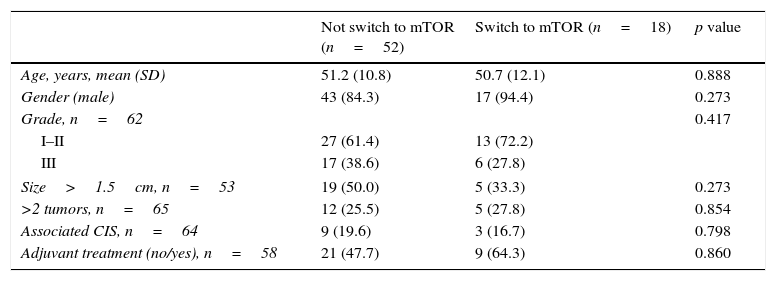Bladder cancer (BC) in the transplanted population can represent a challenge owing to the immunosuppressed state of patients and the higher rate of comorbidities. The objective was to analyze the treatment of BC after renal transplant (RT), focusing on the mode of presentation, diagnosis, treatment options and predictive factors for recurrence.
Material and methodsWe conducted an observational prospective study with a retrospective analysis of 88 patients with BC after RT at 10 European centers. Clinical and oncologic data were collected, and indications and results of adjuvant treatment reviewed. The Kaplan–Meier method and uni- and multivariate Cox regression analyses were performed.
ResultsA total of 10,000 RTs were performed. Diagnosis of BC occurred at a median of 73 months after RT. Median follow-up was 126 months. Seventy-one patients (81.6%) had non-muscle invasive bladder cancer, of whom 29 (40.8%) received adjuvant treatment; of these, six (20.6%) received bacillus Calmette-Guérin and 20 (68.9%) mitomycin C. At univariate analysis, patients who received bacillus Calmette-Guérin had a significantly lower recurrence rate (p=.043). At multivariate analysis, a switch from immunosuppression to mTOR inhibitors significantly reduced the risk of recurrence (HR 0.24, 95% CI: 0.053–0.997, p=.049) while presence of multiple tumors increased it (HR 6.31, 95% CI: 1.78–22.3, p=.004). Globally, 26 patients (29.88%) underwent cystectomy. No major complications were recorded. Overall mortality (OM) was 32.2% (28 patients); the cancer-specific mortality was 13.8%.
ConclusionsAdjuvant bacillus Calmette-Guérin significantly reduces the risk of recurrence, as does switch to mTOR inhibitors. Multiple tumors increase the risk.
El tumor vesical (TV) en la población trasplantada representa un desafío debido al estado de inmunosupresión de los pacientes y a la mayor tasa de comorbilidades. El objetivo de este estudio fue analizar el tratamiento del TV tras el trasplante renal (TR), centrándose en el modo de presentación, diagnóstico, opciones de tratamiento, factores predictivos de recurrencia y mortalidad cáncer-específica.
Material y métodosSe realizó un estudio observacional prospectivo con un análisis retrospectivo de 88 pacientes con TV después de TR en 10 centros europeos. Se recogieron datos clínicos y oncológicos y se revisaron las indicaciones y los resultados del tratamiento adyuvante. Se aplicó el método de Kaplan-Meier para el análisis de la supervivencia y regresión de Cox uni- y multivariante para identificar los factores de riesgo.
ResultadosEn la revisión se incluyeron un total de 10.000 TR, identificando 87 pacientes con TV de novo, tras una mediana de seguimiento de 126 meses. La mediana del tiempo al diagnóstico fue 73 meses posterior al TR. Setenta y un pacientes (81,6%) fueron diagnosticados de TV no músculo-invasivo, de los cuales 29 (40,8%) recibieron tratamiento adyuvante: 6 de ellos (20,6%) recibieron el bacilo Calmette-Guérin (BCG) y 20 (68,9%) mitomicina C. En el análisis univariado los pacientes que recibieron BCG presentaron una tasa de recurrencia del TV significativamente menor (p=0,043). En el análisis multivariante, el cambio de la inmunosupresión a inhibidores de mTOR redujo significativamente el riesgo de recurrencia (HR: 0,24; IC del 95%: 0,053-0,997; p=0,049), mientras que la presencia de múltiples tumores lo aumentó (HR: 6,31; IC del 95%: 1,78-22,3; p=0,004). Globalmente, 26 pacientes (29,88%) se sometieron a cistectomía, sin registrarse complicaciones mayores. La mortalidad global fue del 32,2% (28 pacientes) y la mortalidad cáncer-específica del 13,8%.
ConclusionesEl tratamiento con bacilo Calmette-Guérin adyuvante y el cambio a inhibidores de mTOR reduce significativamente el riesgo de recurrencia de TV en TR, mientras que la presencia de tumores múltiples aumenta el riesgo.











